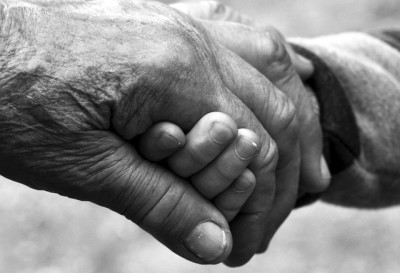by Deepa Venkatraghvan
In 2016, my grandparents died. First my grandfather, my thatha. And then my grandmother, my paati. Obviously, I was very sad when this happened. But what devastated me was not the fact of their passing. They were both over 90 and we were all prepared for it to happen. It was the timing of my paati’s passing that hit me really hard. Her decline began just a few hours after she heard of my thatha’s passing. She slipped into semi-consciousness and passed away on the twelfth day after his death.
She’d been grappling with severe age-related health conditions over the last several years – dwindling lung capacity, hyperglycemia and erratic blood pressure. In the last one year alone, she’d been in the hospital, in fairly critical condition, more than three times. But she always rebounded. Not always with the same vigor, but she did recover and come home. But not this time. Because this time, the timing was right. She chose to go. She let go.
Paati had frequently commented that she would “see him off first,” referring to my thatha. Everyone had been aghast by that comment. How could paati be so insensitive?
How wrong we were. Paati was quite the opposite. As selfless as one could get. To this day, I believe she said what she said because she knew that without her, her husband would not cope. He would turn into a lonely, frustrated man who would snap at his caregivers, his children, his grandchildren. She needed to be there, to allay his loneliness, to absolve his snippiness. She needed to be there to help him cope with age as modestly as possible. And when she felt her job was done, she decided to go.
Each time she made a trip to the hospital and bounced back, we imagined a variety of incentives – the impending wedding of a grandchild, the imminent birth of a great grandchild. Of course she had a zest for life but the timing of her death makes me believe that in the end, she held on each time for thatha, her husband of 74 years. During all this time, she took high dosage insulin shots, administered by herself. She took three rounds of oxygen supplementation every day. She subject herself to medication and pain, just so she could be there for thatha.
While women in our culture are expected to be selfless and put the husband before self, holding on to that virtue while in pain and illness is in my opinion, something only a very resilient woman would do. Paati had always been strong willed, and she followed her heart. At the same time, she conformed to social norm. It’s hard to put to words the finesse of her character but as an example, she accepted that as a woman, her place was inside the home. She was pulled out of school and married in her teens. She never complained or tried to rebel. But she did a spectacular job in her role as the woman of her home. It’s not easy keeping together a family of 5 sons, 5 daughters-in-law, 1 daughter, a son-in-law and an army of grandchildren. But that’s what she did. She not only kept us together, she taught us to manage our personalities and live together.
They talk about the broken-heart syndrome. My paati broke my heart. I don’t know if I can ever love so selflessly, live so magnanimously and die so willfully. I don’t know if I can ever hold on and let go, the way she did.
But I know I am not the same anymore. In life, as in her death, she taught me to be accepting, to be bold and resilient, to be selfless and loving and above all, to live life on my own terms within the boundaries of social and moral conduct. And those values, I will never let go.
I won’t see you, nor
hear, smell or touch you. But I
will remember you
and be forever grateful
for that marvelous sixth sense.






Excellent and touching and true article Deepa. Keep it up. It has come from your heart.
jayaraman
Very touching narration with lots of hidden values attached and to be digested. Crisp and short writing drove the point of view.
As I see, the dedication and love was so deep that even death could not separate them for longer period.
Deepa, remarkable!